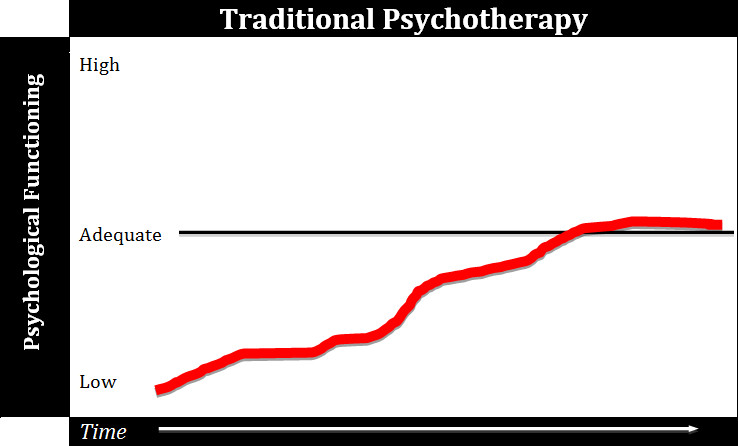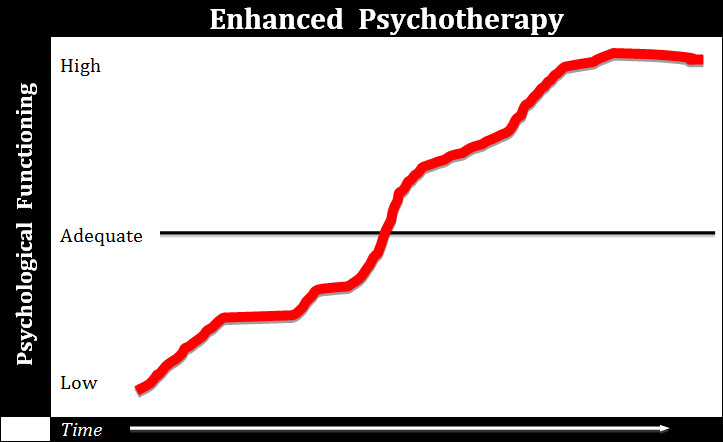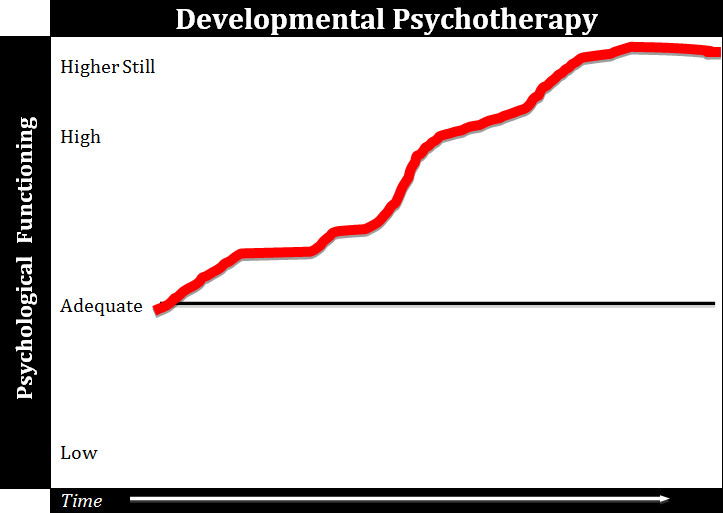“ I really believe that everyone out there could benefit from therapy, whether they are dealing with relationship or job issues, or stress or depression.”
~ Howie Mandel
A common misconception is that psychotherapy is beneficial ONLY for people who are mentally ill. The history of psychology makes this misconception understandable. Originally counseling and psychotherapy were designed as therapies to help people regain normal psychological functioning – see the chart labeled Traditional Psychotherapy. The Traditional Psychotherapy chart portrays the system with which we are all familiar. A person who is “ill” or not functioning well comes to see a counselor or psychologist, receives psychotherapy and gets better over time. As the person seeking services moves from low functioning to adequate functioning, the therapy is over. While the person in this case has been helped, there is more improvement that can be made.
Mental Health is on a continuum
Psychological functioning can almost always be improved, even in those who are not diagnosable as mentally ill. As psychotherapy and psychology were developing, they became attached to the medical system – and medical insurance. People began to associate psychological functioning with the language of medicine. The use of the concepts ‘mentally ill’, ‘psychiatric disorder’, etc had an overlap between medicine and psychology. A number of people use medications to improve their energy, mood, clarity of thought and feel calmer. However, the subsuming of psychology by the medical system ignores the improvement of mental health as a goal. Our culture has come to see mental health as akin to strep throat. Prior to getting strep throat I feel fine, I get strep throat and feel terrible, I then go get antibiotics from a physician, take the antibiotics, and then feel better again. This model starts with adequate functioning > illness > return to adequate functioning. The illness model works well for strep throat, but not for psychological functioning. Psychological health is more than overcoming difficulties. Psychological health includes striving for ones highest potentials.

Enhanced Psychotherapy
When a person in the traditional model has gained or regained adequate functioning then therapy is complete. If the client’s goal is only to gain adequate functioning, then therapy can be complete at this point. Some people want to move beyond adequate functioning, to higher levels of functioning. I call this enhanced psychotherapy. This is not like going to the doctors office to make sure that you do not have an illness, rather this is more akin to going to the gym to develop better capacities of endurance and strength. Psychologically it may be developing deeper, richer relationships or finding higher meaning and purpose in life. Psychotherapy can help with that as well.

Developmental psychotherapy
What if I am functioning fine already – can psychotherapy help me? Yes! The US Army once used the slogan – “Be all you can be.” Pychotherapy may take a different approach to helping you be all you can be. Counseling or therapy can challenge you to grow beyond adequate functioning to expand yourself. If you are happy, content and pleased with your life – what more could you do to reach your goals even more consistently? What could you do to enrich your relationships even more completely than they are now?

Some people go to an executive coach to help develop specific skills, Developmental psychotherapy is developing not just specific skills, but a whole array of life skills at broad levels.
Michael Winters is a Psychologist in Houston focusing on marriage counseling and therapy. Michael received his PhD from the University of Memphis and has been practicing since 1991.

